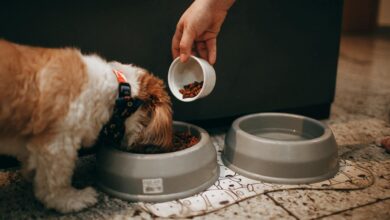
Making a backyard that is not solely lovely but additionally secure to your pets is a purpose each pet proprietor can obtain. On this information, we’ll discover the world of pet-friendly crops, making certain that your backyard stays a secure and pleasant haven to your furry companions.
Table of contents
Designing a Pet-Pleasant Backyard
1. Analysis Pet-Protected Crops
Earlier than you begin planting, analysis crops which are secure to your pets. Go for non-toxic varieties that will not hurt your furry buddies in the event that they resolve to nibble or discover. Some in style pet-safe decisions embrace marigolds, petunias, and sunflowers.
Professional Tip: The American Society for the Prevention of Cruelty to Animals (ASPCA) gives a complete record of poisonous and non-toxic crops for pets on their web site.
2. Keep away from Poisonous Crops
To hold your pets secure, it is essential to determine and keep away from poisonous crops. Widespread backyard crops like lilies, azaleas, and oleander could be dangerous and even lethal to pets. Familiarize your self with poisonous crops in your area to make sure they haven’t any place in your backyard.
Professional Tip: Spend money on a pet-friendly backyard app or seek the advice of a neighborhood nursery for recommendation on secure plant decisions.
3. Create Designated Pet Areas
Take into account creating particular areas inside your backyard the place your pets can play, discover, and do their enterprise. Use fencing, pathways, or backyard borders to outline these areas and information your pets away from delicate crops.
Professional Tip: Incorporate ornamental fencing or pure boundaries like shrubs to outline pet and plant zones.
Pet-Pleasant Plant Selections
1. Pet-Pleasant Flowers
Select pet-friendly flowers so as to add shade and vibrancy to your backyard. Some secure choices embrace:
- Marigolds: These cheerful blooms are non-toxic and add a burst of shade to your backyard.
- Sunflowers: Their towering stalks and sunny faces carry pleasure to each you and your pets.
- Snapdragons: With vibrant colours and distinctive blossoms, snapdragons are a pet-safe alternative.
- Roses (with thorns eliminated): Pruned rose bushes could be secure in case you take away thorns and monitor your pets’ interplay.
Professional Tip: Maintain your pets’ allergic reactions in thoughts. If they’ve pollen allergic reactions, go for flowers that produce much less pollen.
2. Pet-Pleasant Herbs
Herbs not solely improve your cooking however will also be secure and pleasant to your pets. Strive planting:
- Basil: A aromatic herb that provides taste to your meals and is secure for pets.
- Mint: Excellent for teas and recipes, mint is non-toxic to your furry buddies.
- Parsley: A flexible herb that is each tasty and secure.
- Thyme: This fragrant herb is a pet-friendly alternative to your backyard.
Professional Tip: Create an herb backyard that is simply accessible to each you and your pets.
3. Pet-Pleasant Greens
Develop pet-friendly greens that you just and your pets can get pleasure from collectively. Take into account:
- Carrots: Crunchy and nutritious, carrots are a favourite amongst many pets.
- Zucchini: A flexible and non-toxic vegetable.
- Inexperienced Beans: These make for a wholesome and secure snack.
- Candy Potatoes: Wealthy in vitamins, candy potatoes are secure for pets.
Professional Tip: Incorporate greens into your pets’ diets, providing them recent from the backyard.
4. Pet-Pleasant Bushes
Bushes can present shade and sweetness to your backyard. Go for pet-safe choices like:
- Dogwood: Recognized for its beautiful spring blossoms, it is secure for canine and cats.
- Maple: These timber provide gorgeous fall foliage and are pet-friendly.
- Palm: Palms are non-toxic and create a tropical ambiance.
- Bamboo (non-invasive varieties): A sustainable alternative that is secure for pets.
Professional Tip: Guarantee there’s sufficient house to your pets to play safely beneath the timber.
5. Crops that Repel Fleas and Ticks
Choose crops that naturally repel fleas and ticks. Lavender, rosemary, and marigolds might help hold these pests at bay, offering further consolation to your pets.
Professional Tip: Plant these pest-repelling crops close to entrances and gathering areas to maximise their effectiveness.
Backyard Security for Pets
1. Fencing and Backyard Borders
Set up safe fencing or backyard borders to hold your pets inside designated areas. Be sure that gates are correctly closed and latched to forestall them from wandering into probably hazardous components of your backyard.
Professional Tip: Take into account ornamental fencing to reinforce your backyard’s aesthetic attraction.
2. Pest Management
Go for pet-friendly pest management strategies. Keep away from poisonous pesticides and herbicides that may hurt your pets. As a substitute, take into account pure alternate options and companion planting to discourage backyard pests with out risking your pets’ well being.
Professional Tip: Analysis and implement natural pest management options which are secure for each pets and crops.
3. Supervise Your Pets
When your pets are within the backyard, supervise them to make sure they do not ingest dangerous crops or dig up delicate flowers.
Your watchful eye can forestall unintentional plant consumption or backyard mishaps.
Professional Tip: Use constructive reinforcement to prepare your pets to respect backyard boundaries.
Particular Issues
1. Pet-Protected Indoor Crops
Indoor crops also needs to be non-toxic to pets. Take into account:
- Spider Crops
- Boston Ferns
- African Violets
Professional Tip: Place indoor crops out of your pets’ attain to forestall nibbling.
2. Create a Pet-Pleasant Oasis
Improve your backyard with cozy corners, pet-friendly furnishings, and a water supply like a birdbath or small pond. These additions create a cushty house the place your pets can calm down and savor the backyard.
Professional Tip: Add pet-friendly paths or stepping stones to forestall muddy paws.
3. DIY Backyard Initiatives
Interact in enjoyable DIY pet-friendly backyard tasks:
- Construct a chosen sandbox to your cats.
- Create a shaded resting space to your canine.
- Set up a birdhouse or hen feeder to entertain your pets.
Professional Tip: Contain your pets in these tasks to stimulate their curiosity and engagement.
Pet-Pleasant Crops
With considerate planning and care, your backyard can turn out to be a secure and pleasant house for each you and your pets. Benefit from the lovely moments shared on this oasis, understanding that your pets can discover freely with out fear.








